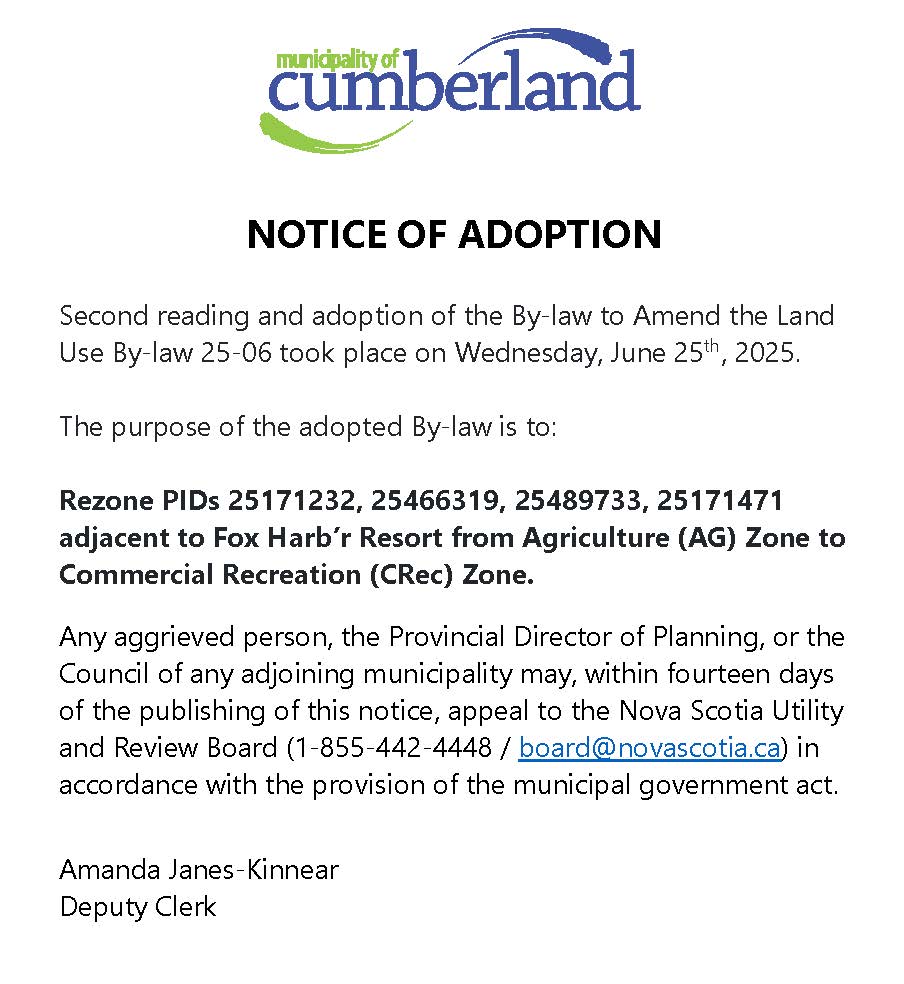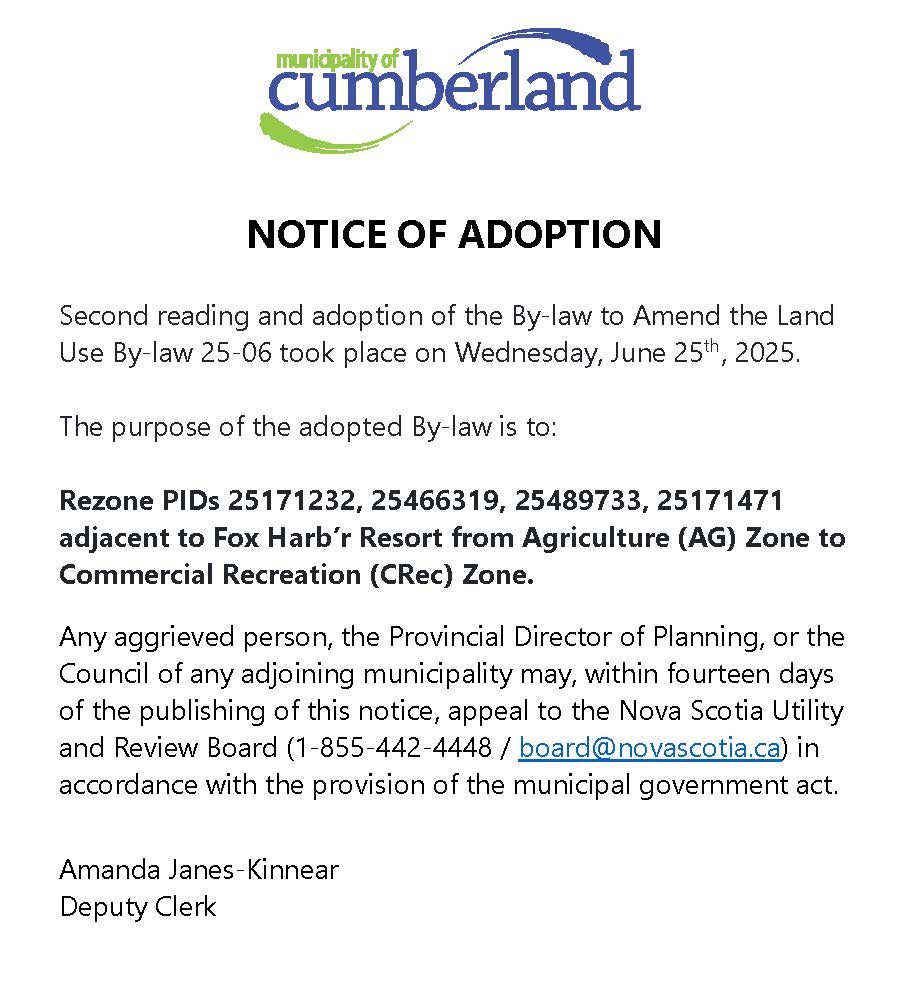News

Parrsboro millennium time capsule offers a glimpse back to July 2000
- Details
In mid-July 2000, then U.S. President Bill Clinton welcomed the president of Israel and the head of the Palestinian Authority to Camp David for a peace summit in an effort to end strife in the Middle East.
At the same time, a group of people in the former town of Parrsboro were coming together to place a time capsule in town hall in celebration of the new millennium. A quarter century later, a few of those people came together once again to reopen the capsule at its new home in the Parrsboro Service Centre.
“It’s a real walk down memory lane,” Gleneida Canning said while watching the box containing numerous items from July 2000 be opened by Municipality of Cumberland Mayor Rod Gilroy. “The millennium committee wanted to do something special to mark the occasion and the idea of a time capsule was something that was quite popular. A lot of people participated. It was a great community project and a way to help mark the new millennium.”
Canning was a member of town council at the time and served on the millennium committee with the late mayor Doug Robinson, teachers Norma Collison and David Skidmore, Alice Patterson and April Strong.
A centrepiece of the time capsule was a small chest of letters students from Parrsboro’s schools wrote to themselves in 2000. The goal of the millennium committee was for those letters to be returned to students in July 2025 after the capsule was opened.
Collison, a teaching vice-principal at Parrsboro Elementary at the time, remembers the project as if it were yesterday.
“We were all excited about it. We got all the students to write letters to have them involved in it,” she said. “I didn’t know if we’d see it again with everything that’s gone on. I am so happy to see it again. I haven’t seen it since it was sealed.”
Collison is hoping those who wrote the letters are able to get their copies so they can learn what they wrote to themselves at the turn of the millennium.
“I remember everyone of those names. Quite a few of them are still here in the area, but sadly, some have passed away,” she said.

News from Cumberland municipal council's July 16 special meeting
- Details
Cumberland municipal council approves its 2025-26 priorities
Cumberland municipal council adopted its 2025-26 priorities during a special council meeting on Wednesday, July 16, 2025.
The 2025-26 priorities document was created through combining the information that council generated through your priority setting exercise, with a similar exercise that senior staff completed.
The five priorities council determined as most important for 2025-26 include plan for the hub fire service model, options for River Hebert water, improving infrastructure for new development, develop an approach to tourism and community capacity planning.
There are also several operational priorities, arranged by department.

Municipality of Cumberland Provides $913,000 in Grants to Community Organizations
- Details
Each year the Municipality of Cumberland supports numerous organizations through County General Grants and 2025-26 is no different with the municipality providing in excess of $910,000 to close to approximately 70 organizations in support of programs and events with the aim of promoting arts, culture, tourism and recreation.
Mayor Rod Gilroy was joined recently by Deputy Mayor Fred Gould and Councillors Marchel Strong, Jennifer Houghtaling, Scott Lockhart and Angel McCormick in presenting cheques to representatives of various organizations at the Upper Nappan Service Centre, the River Hebert-Joggins Community Centre, the Pugwash Farmers Market, the Dr. Carson & Marion Murray Community Centre in Springhill and Ship’s Company Theatre in Parrsboro.
“We’re extremely pleased the municipality is able to provide support to many community organizations every year,” Mayor Gilroy said. “These organizations are made up of volunteers who provide a valuable service in their communities, including museums, recreational organizations and community centers and many non-profit organizations.
“These are valuable services that we could not replace.”

Notice of Adoption
- Details
Second reading and adoption of the By-law to Amend the Land Use By-law 25-06 took place on Wednesday, June 25th, 2025.
The purpose of the adopted By-law is to:
Rezone PIDs 25171232, 25466319, 25489733, 25171471 adjacent to Fox Harb’r Resort from Agriculture (AG) Zone to Commercial Recreation (CRec) Zone.
Any aggrieved person, the Provincial Director of Planning, or the Council of any adjoining municipality may, within fourteen days of the publishing of this notice, appeal to the Nova Scotia Utility and Review Board (1-855-442-4448 / 

Municipality celebrates opening of new state of the art fire station in Springhill
- Details
Springhill and area residents came together on Saturday, June 21, 2025, to celebrate a significant milestone in the opening of its new fire station on Miners’ Memorial Drive.
Members of the Springhill Fire Department were joined by residents, municipal representatives and fire chiefs from other Cumberland County fire departments to help mark the occasion that included cutting the ribbon to officially open the new 11,000 square-foot facility. The ribbon-cutting was followed by guided tours of the facility that replaces the former fire station on Main Street that served as the department’s home since 1972.
“This facility is a significant investment in our department, in the Cumberland Fire Service and in our community,” Chief Matthew Ward said. “Designed to meet the needs of the modern fire service, it provides greater space, greater safety and greater opportunity for Cumberland County’s volunteer fire fighters.”
Construction of the new fire station began last July with Iron Maple Constructors leading the project from ground-breaking to its completion.
